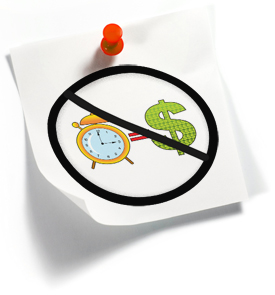 If you’re a freelancer in your chosen profession and you don’t track your time, you can count on one thing: you won’t be a freelancer for long.
If you’re a freelancer in your chosen profession and you don’t track your time, you can count on one thing: you won’t be a freelancer for long.
At six years and counting, I think I’ve finally got freelancing down. Every time before this – this is my fourth time as a freelancer – I lasted about a year before my cash flow ran out and I ended up punching the clock for someone else’s pleasure. All because I wasn’t smart with how I handled time. I see that now.
Time has a flow, but unlike cash, it doesn’t rise or fall; it’s steady. Everywhere in the world, there are 24 hours in a day. Money comes and goes. Sometimes you have more. Sometimes you have less. (Well, more or less.) That’s why the cliché “Time is Money” is wrong. Time is not money. And as much as I like the implications, time is also not a river.
Before we can really talk about why time tracking is important to freelancers, we have to get a good look at this thing we’re all chasing and call it by what it really is. It’s not some clever metaphor or a list of things that all start with the same letter. Time is time.
Who’s Tracking Time?
I usually call myself a freelancer, but independent is probably closer to the truth. According to the all-mighty Webster’s, an independent is 1: not dependent; 2: not affiliated with a larger controlling unit; 3: not requiring or relying on something else; and 4) not looking to others for one’s opinions or for guidance in conduct.
When the very definition of how I see myself contains the idea that I don’t have any management issues to deal with because I’m an independent (or freelancer or self-employed; they’re interchangeable), it’s tempting to think it’s true.
But you know the truth. As a business owner, freelancers deal with decision-making, problem solving, goal setting and organizing every day. Sure, non-freelancers face those things, but they usually have the option of delegating those responsibilities to someone else. For freelancers, it’s something we can never get away from. Get better at managing yourself and you’ll instantly get better at managing your use of time.
How to Uncover Lost Time
Tracking time works best when it’s a conscious act. That’s doubly important to a freelancer because it’s a significant step in learning to anticipate distractions and teaching yourself to instinctively work around them. In my previous blog, I said, “Time tracking is important because it uncovers lost time.” Here’s how: That first post took me five hours to write. Because I tracked my time (in writing) and was conscious of where it went (and why), I was able to avoid those distractions and complete this post in four hours.
If I hadn’t kept track of today’s writing distractions (Twitter, email, phone calls I should have kept shorter) as well as the amount of time those things ate up, at the end of the day, I’d be at a loss to explain where all my time went. If I hadn’t kept track of my non-work time (“un-billable time”) and if I’d hadn’t done it in writing (like some casual way in my head), I wouldn’t have recognized these specific distractions when they came up and therefore, I wouldn’t have known how to handle them. You can’t avoid something you don’t know about, right?
The Heart of Time Tracking
Right now, you’re spending X minutes reading this blog. What if you could come away with three times as much time as the time you’ll invest reading it? A tongue twister, for sure, but it doesn’t need to be a head-twister.
You can uncover the most time by tracking time with your head (what we’ve covered so far) and your heart. Which brings us back, like some odd strain of time-travel, to where we started:
“If you’re a freelancer in your chosen profession and you don’t track your time, you won’t be a freelancer for long.”
Think back to why you chose this particular profession. Because that’s where your heart was, right? If you don’t want to track your time now, it’s either because it feels like a step backward or because you had a bad experience with it in the past. If uncovering more time each day sounds like a step backward, it might be time to consider a new profession. As far as recovering from bad experiences goes, that’s perfectly understandable. I used to hate doing it myself. Then someone told me something I should have known: If you don’t know where your business is spending its time, who does?
Which is well and good for a freelancer who is…oh, I don’t know, a writer…but what about other industries? Are the skills for tracking time the same in every profession? They are. And yet some freelance professionals who track their time are clearly more productive than other freelancers who also track their time, so what gives?
Next Time: What Time Tracking Clues mean to Consultants and Web-related Professions.
(Phoenix wordsmith Joey Robert Parks is primarily a non-fiction ghostwriter. In the last six years, he’s written five books for successful, entrepreneurial types; including: a fashion designer and stylist who got his start working for JFK and Oprah; and a book on creative innovation for a high profile, multimillionaire philanthropist. To see how productive Joey is this very moment, follow him on Twitter or visit www.joeyrobertparks.com)